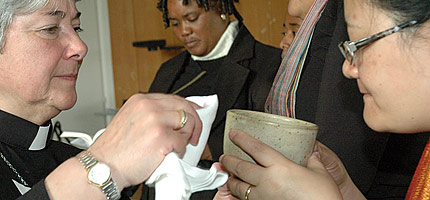© LWF/T. Rakoto
05.11.2009
Hungry for the Bread of Justice
“Less Than a Full Communion” When Women Are Barred from Leadership
GENEVA, 5 November 2009 (LWI) – A woman living on the street with her eight-month-old child secured with a blue cord to a trolley with paper cartons: “This is the face of human trafficking in Africa,” remarked Ms Colleen Cunningham, Southern Africa coordinator for the Women in Church and Society (WICAS) desk of the Lutheran World Federation (LWF) Department for Mission and Development (DMD).
The street woman comes from the Democratic Republic of Congo, explained Cunningham. She was trafficked to South Africa, where she became pregnant, and was sold to Namibia to work as a street vendor in the capital, Windhoek. Her stall is located between a church and the parliament buildings.
The WICAS coordinator cited this example in her contribution on regional perspectives at the 27-31 October LWF Women’s Pre-Assembly (WPA) meeting at Bogis-Bossey, near Geneva, Switzerland. Deliberations evolved around the LWF Eleventh Assembly theme, “Give Us Today Our Daily Bread,” and its implications for gender and power in church and society.
Cunningham, a member of the Moravian Church in South Africa, shared the insights on human trafficking from her WICAS work in the Lutheran Communion in Southern Africa (LUCSA), one of three LWF sub-regional bodies in Africa.
Dignity and Identity
She listed several other contextual issues that have a negative impact on the identity and dignity of women in the Africa region, including gender-based violence, HIV and AIDS, women’s access to land and food security.
“But there are also success stories,” Cunningham said. She spoke of the Female Theologians Forum of ordained and lay women, which seeks to empower female theologians and to promote ordination of women in the sub-region.
“LUCSA has over the years been seriously concerned about gender inequalities in church and society,” said Cunningham. “Regretfully, almost all member churches within LUCSA have to date not restructured themselves in a manner that promotes gender equality.” She noted that “no serious effort” had been made to achieve the agreed 40 percent female representation that would eventually lead to equal status. “Dioceses and local parishes in Southern Africa lag behind most of their local governments who have established gender commissions or ministries to address issues of gender inequalities,” she explained.
Sexual Violence
“We are hungry. We are hungry for shifts in our social system and in our theology that give us the bread of justice, justice for women and girls,” affirmed Dr Mary J. Streufert of the Evangelical Lutheran Church in America (ELCA) Justice for Women program. “Sexual violence is high in the United States: 78 rapes an hour or 1.3 rapes per minute occur in the US. In the US, only six percent of rapists will ever spend a day in jail. And one in three girls is sexually abused before she turns 18,” said Streufert.
“The ways in which sexual violence reveals the socially enforced assumption of male privilege over our bodies seems to me to be connected to the socially enforced assumption of male privilege over our leadership and actions in the church,” she noted.
Streufert cited examples of sexual assault, voyeuristic ownership of women’s bodies, and verbal degradation, as some of the ways in which “we women and girls are silenced into this social norm of male privilege,” she added.
According to Streufert two central themes in Luther’s theology create the space for the ELCA program “to focus on sexism as a problem and empower me personally as a leader […] These two themes are justification by grace through faith and being a feminist theologian of the cross.”
She said the objectives of the ELCA Justice for Women program are to educate for justice, advocate for change and lead into the future, making justice for women a reality.
The WPA participants summarized the outcome of the international LWF gathering in a final message that singles out human trafficking, women in leadership and food justice as core issues for the Lutheran communion, especially in preparation for the Eleventh Assembly to be held in Stuttgart, Germany, in July 2010.
Cultural Transformation
Their message underlines “hunger for justice and the bread of life” not only in society but also in the Lutheran communion. They express their yearning for cultural transformation especially in the LWF communion, which they see as “as less than a full communion when women are barred from leadership,” among other manifestations of exclusion.
The October gathering joined the LWF Council in decrying human trafficking for the purposes of forced labor, sexual exploitation, forced marriage, armed conflict or organ harvesting, which delegates said, turned “human beings into commodities.”
The pre-assembly called upon LWF member churches to pave the way for women to take positions of leadership. The participants affirmed the communion commitments to women’s ordination and urged the Federation to create opportunities for women to be highlighted in their leadership roles as a witness throughout the global communion. One of the strategies that the WPA recommended is organizing theological discussions and identifying the requisite gender justice principles to enable LWF member churches contextualize and promote gender policies.
In addition, the Women’s Pre-Assembly affirmed the right of all persons to safe nutritious food and clean water, lamenting the fact that while women remain the main food producers, they are often the last to receive their daily bread. “Food justice demands just production, distribution and consumption,” the meeting concluded. (899 words)
Womens_Pre-Assembly_Message.pdf [PDF, 2MB]
Journey | Women's Pre-Assembly

